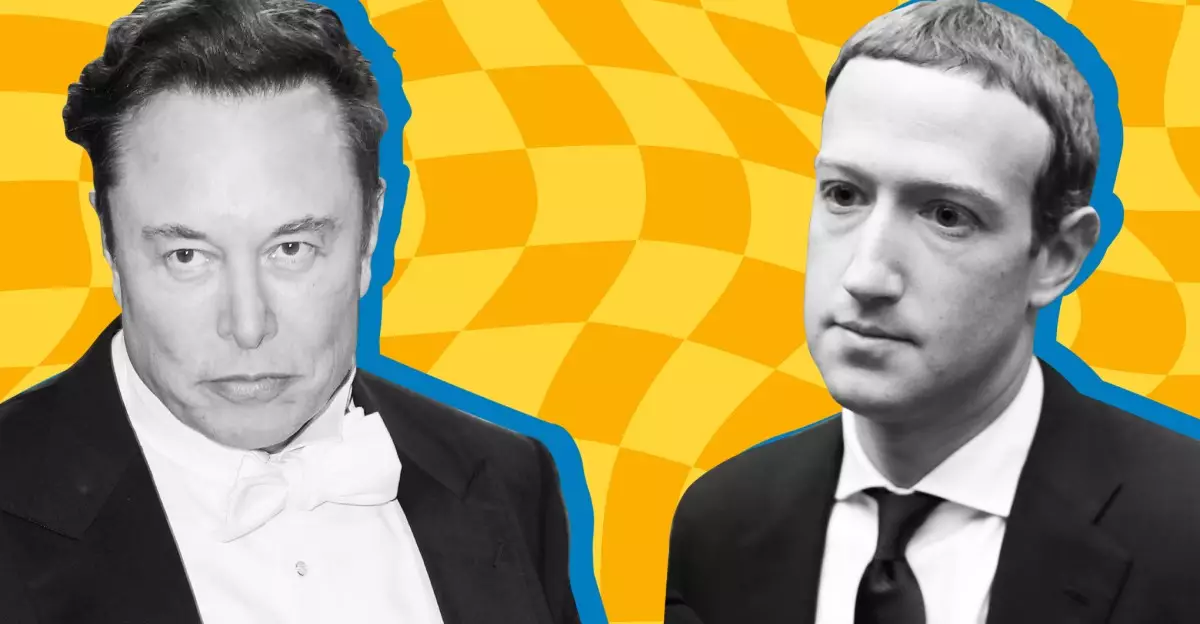In an unexpected yet stinging social commentary, technology lovers and critics alike have turned California’s illuminated crosswalks into a stage for mockery. Using AI-generated voices, pranksters have transformed the mundane act of crossing the street into a moment of political satire and social critique, jokingly impersonating tech giants Elon Musk and Mark Zuckerberg. This isn’t just a prank; it’s a vivid illustration of how technology can blur the lines between reality and fantasy, as well as the opportunity to critique the very industry that shapes our lives.
A series of incidents across several cities, including Palo Alto, Redwood City, and Menlo Park, revealed that crosswalk systems had been hacked to emit the faux voices of these prominent tech leaders. Videos shared online showcased this bizarre twist, as created characters mimicked Musk’s longing for companionship and Zuckerberg’s self-aware reflections on societal impacts. The absurdity of these voices—one moment beguiling listeners with jokes and the next calling out their own ethical dilemmas—has turned pedestrian safety equipment into a circus of tech criticism. They are not merely manipulating voice technology; they are engaging the public to think critically about the people behind these technological advancements.
The Voice of AI: Satire Meets Reality
The sheer audacity of the hack has highlighted how seamlessly technology melds into everyday life, even in the most unexpected places. Crosswalk buttons, designed primarily for the visually impaired, now inadvertently serve as conduits for cultural commentary. The amusing impersonations by the AI clones are not just humorous; they demand attention to the ethical ramifications of technology in a society increasingly reliant on algorithms and machine learning.
For instance, while Musk voices his existential crises with lines about loneliness, it invokes a deeper discussion about the isolation that often accompanies the tech elite. Simultaneously, Zuckerberg’s brazen remarks on “undermining democracy” reflect the creeping skepticism surrounding social media platforms. The playful mockery cleverly gives voice to frustrations that many individuals harbor against these industry leaders. These moments serve as both laughter and reflection, as audiences engage with a powerful critique of the sociopolitical implications of their careers.
Community Impact: A Digital Disruption
One might wonder how this playful confusion disrupts the vital function of crosswalks intended for those with visual impairments. Yet the impacts extend beyond mere inconvenience; they reflect a growing societal conversation about digital ethics and the responsibility of technology creators. Local city officials have disabled the voice features on these crosswalk signals pending repairs—an indication of the gravity the situation holds in terms of public safety and the unexpected consequences of tampering with tech.
This desire to play with technology goes beyond the realm of pranks; it brings forth discussions about accessibility and the voice of the people in the context of digital regulation. The voices intended to guide pedestrians have been upended to embrace satire, which ultimately reveals the tensions inherent in the tech landscape. Users must navigate an environment where innovation bounces between utility and absurdity, and the very systems meant to protect and guide, can be subverted and seemingly ridiculed.
Technological Accountability: The Bigger Picture
At the heart of these amusing impersonations lies a more serious discourse regarding accountability. As societal reliance on technology continues to deepen, the onus falls on creators to ensure their innovations cater to a comprehensive ethical framework. The prank’s resonance indicates a bubbling frustration within the public, raising questions about moral responsibility in tech. Are developers creating products that support society or undermine its ethical foundation? In jest, these AI clones of Musk and Zuckerberg become the unwitting figures through which audiences can voice dissent directed at the backdrop of their respective legacies.
Furthermore, as the allure of AI storytelling explodes, we must ponder the narratives we allow to proliferate in digital spaces. This incident sends a powerful message that society is ready to hold the titans of technology accountable even through humor. The appropriation of their voices in crosswalks echoes a demand for more profound engagement from these leaders—calling them to take ownership of their impact with a blend of wit and sharp critique.
In this spontaneous act of humor, the boundaries of voice technology, ethical implications, and individual accountability converge, revealing that while we may traverse crosswalks with some trepidation, we can also navigate the world of technology with an insightful lens of critique, laughter, and hope.


Leave a Reply
You must be logged in to post a comment.